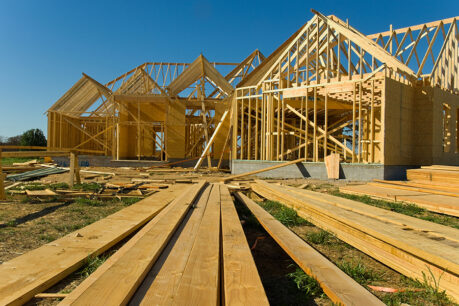
Searching for your dream home can take a lot of patience and compromise, but what if you discover that it just doesn’t exist yet? When you build your home, you have more control over as much as possible, down to your door’s paint color. However, financing for this type of project is different than a regular mortgage. Before you start picking out cabinets or deciding whether you want a clawfoot bathtub or shower stall, find out what to expect from the construction loan process.
What’s a Construction Loan?
A construction loan funds the building of your home and can cover certain costs, such as the land, contractor fees, construction materials and necessary permits.
Loan Types
Like many other mortgages, there are a variety of construction loan types to choose from depending on your needs, specific situation and qualifications. Check them out below to see which one may work for you.
Construction-to-Permanent
This type of loan covers the cost of the construction of your home and then converts to a traditional mortgage once your home construction is completed. During the construction phase of this loan, you’re responsible for interest payments as money is drawn for the construction. After the loan is converted to a mortgage, you’ll make payments for interest and principal.
There are a couple types of construction-to-permanent loans, including conventional, Federal Housing Administration (FHA) insured and Veterans Affairs (VA) construction loans if you’re an eligible U.S. military borrower.
Construction Only
These types of loans are self-explanatory. They only cover costs of building the home, including the cost of the plot, labor, building materials and permits. For this type of loan, however, you’d have to spend the time shopping for a separate mortgage and will need to pay two sets of closing costs as opposed to one when you opt for a construction-to-permanent loan.
Renovation or Rehabilitation
If you find a home that’s almost perfect but needs some tender loving care, you may want to consider a renovation loan to fix the imperfections and make it livable. Upgrading a home in this way can cost significantly less than building a home from scratch so this option may work if you have a smaller budget.
Owner-Builder Construction
For those who are general contractors or professional builders who want to build and finance their own project, you may opt for an owner-builder construction loan. You’ll be both the borrower and builder, but you typically must be a licensed builder by trade. However, not all lenders allow for this type of loan so make sure you double check with yours if you’re interested in an owner-builder construction loan.
Land
This type of loan only covers the cost of the land that doesn’t have any habitable buildings on it. It may be empty or have other older structures that aren’t habitable. When you opt for this type of loan, you will need to find other financing for the construction of your home.
The Construction Loan Process
Construction loans can seem complicated but knowing what to expect can help ease your worries and help you understand what you can do to prepare.
- Find Land: Search for the plot of land you want to build your home on.
- Apply for Financing and Get Pre-Approved: Find a reputable lender and apply for a loan. Although getting a pre-approval isn’t required, it’s strongly encouraged so you can understand how much money you qualify for to determine your budget.
- Hire a Builder: Once you know how much you’re pre-approved for, you can start looking for a builder within your budget. Finalize your construction plans with them.
- Close on Your Loan: Get your finances evaluated, your plans underwritten and approved and all numbers finalized to get to closing.
- Begin Construction: Once you close on your loan, your builder can start the construction of your home. The builder will be paid in installments from your loan from an escrow account.
Common Borrower Requirements
Qualifications for a construction loan can vary between lenders but here are some common requirements.
Credit: Typically, you must have good to excellent credit. According to myFICO®, a “good” credit score ranges from 670 to 739, a “very good” credit score ranges from 740 to 799 and an “exceptional” credit score is 800 or higher.
Debt-to-Income (DTI) Ratio: Your DTI ratio is the percentage of your income that goes to paying your debt. Lenders usually require a DTI ratio below 43 percent.
Down Payment: The down payment for a construction loan is typically higher than other loans, and you may have to put down up to 20 percent.
Builder: You will need to work with a licensed, reputable builder and show a contract with them to help get your loan approved.
Frequently Asked Questions (FAQs)
How long does it take to get a construction loan?
The construction loan process generally takes longer than a regular mortgage process. Depending on any delays and your specific situation, it can take anywhere from 30 to 60 days to close on this type of loan.
What are some construction loan disadvantages?
As stated previously, construction loans can take longer than a regular mortgage, so you’ll need to have some patience even before your construction project begins. Also, construction loans generally require more upfront costs, which you’ll need to consider when determining your budget.
What happens if a construction project takes longer than expected?
Delays during the construction process could result in changes to your interest rate, fees and more. To mitigate any roadblocks, make sure you work closely with your contractor and keep your lender updated every step of the way.
Building Your Dream Home
While construction loans can take a little more time than the typical mortgage, it may be worth it if you’re particular about your home essentials and can’t find the perfect property to buy. Ensuring you’re well-educated, have planned properly and are working with dependable professionals can all help minimize delays and barriers during the process.
This article is intended for general informational and educational purposes only and should not be construed as financial or tax advice. For more information on financial planning or investment advice, consult a registered investment advisor or financial planner.
This information is intended for educational purposes only. Products and interest rates subject to change without notice. Loan products are subject to credit approval and include terms and conditions, fees and other costs. Terms and conditions may apply. Property insurance is required on all loans secured by property. VA loan products are subject to VA eligibility requirements. Adjustable Rate Mortgage (ARM) interest rates and monthly payment are subject to adjustment. Upon submission of a full application, a mortgage banker will review and provide you with the terms, conditions, disclosures, and additional details on the interest rates that apply to your individual situation.


